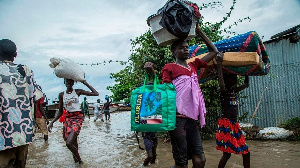Africa News of Friday, 19 May 2023
Source: theeastafrican.co.ke
Rainy season spells another round of doom for South Sudan
South Sudan’s current rainy season is promising a new round of displacements and sickness as hundreds of those fleeing the conflict cross the border to settle in the northern region.
Heavy rains fall in South Sudan between April and November causing flooding and curtailing movements. HelpAge International—an international humanitarian NGO—says that since the start of the fighting in Khartoum on 15 April, over 56,000 people (mainly South Sudanese returnees) have fled Sudan, crossing the border into South Sudan as hundreds more are crossing every day. There is now overcrowding, especially in Renk town, with very poor sanitation conditions, which could severely worsen if the rainy season takes hold.
“Even before the Sudan crisis, conditions were very bad in Renk. There is very little food and clean water and toilets. But now with the massive influx of people, things could get very dangerous. People are defecating in the open and drinking water from the rivers, and if water sources become contaminated, this could cause deadly diseases like cholera, which can be particularly fatal for older people,” said William Ngabonziza, the CEO of Humanitarian Development Consortium (a HelpAge partner) who recently visited Renk.
Renk is situated in the northern-eastern tip of South Sudan in Eastern Nile State, which is the nearest point for those crossing from Sudan’s White Nile and Southern Kordofan states. Mr Ngabonziza said that older people are arriving exhausted and frightened after what they experienced in the conflict in Sudan. Many are desperate to get to places where they used to live before fleeing the civil war in 1983. “At least there they have friends and family who could help them,” he said.
Another NGO Oxfam said that it is highly concerned that the conflict in Sudan could potentially put unsustainable stresses on local communities and services.
Oxfam in Africa Director Fati N’zi Hassane said that 9.4 million people across South Sudan already need humanitarian assistance because of a triple threat of drought, floods, and conflict, with only less than a third (27%) of the $1.7 billion UN Appeal for South Sudan being raised to date. Nearly 30,000 Sudanese have crossed the border to South Sudan and over 6,000 more are arriving daily.
Ngabonziza appeals that people must be supported to leave Renk as soon as possible because there is nothing for them there. The transit centre that is being housed to support the most vulnerable is a university and the staff there could ask for it back at any time.
“The area was already suffering from a food crisis before the conflict broke out and it’s so isolated. We had to bring in everything we needed as you can’t find supplies here. It’s two and a half hours away by plane to Juba, the capital. The roads are deplorable and in the rainy season, virtually unpassable. It really is a race against time to help people as soon as possible,” he said.
You can also watch the latest episode of The Lowdown below:
Entertainment










